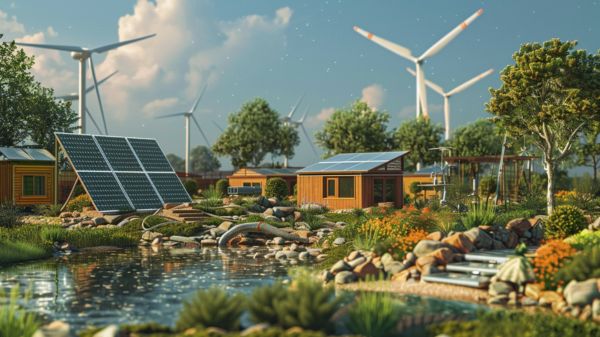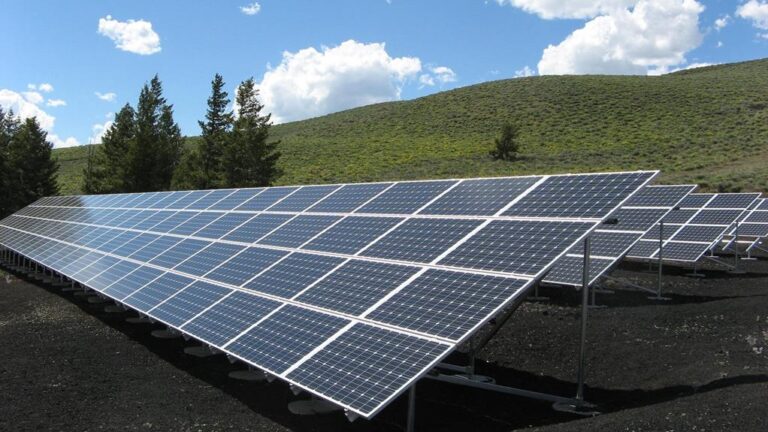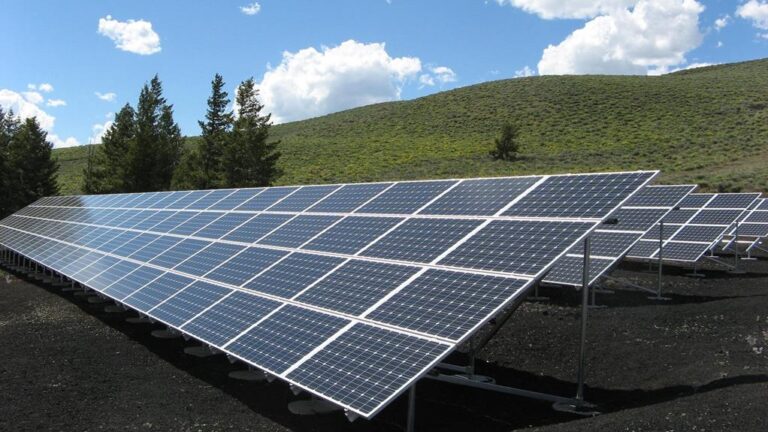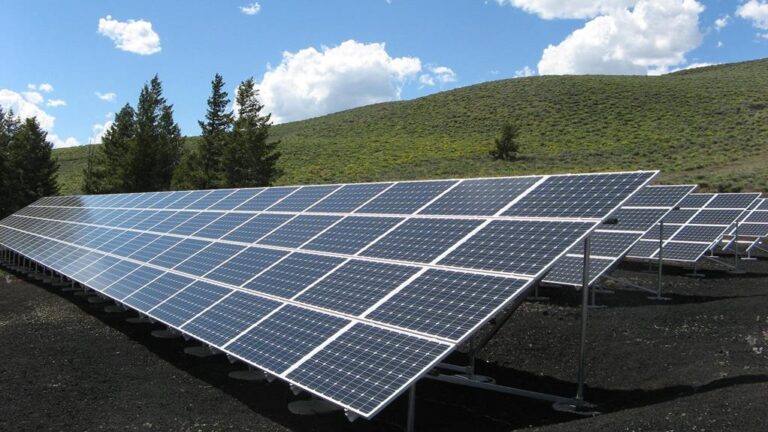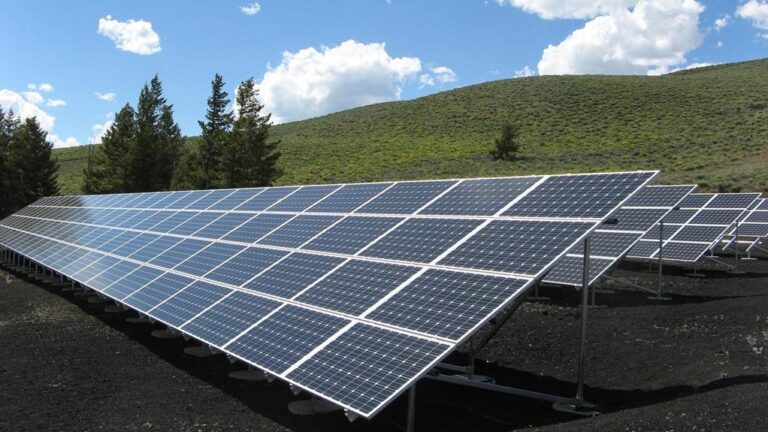What Are the Most Efficient Ways to Harness Solar Energy?
Among the most efficient ways to harness solar energy and maximizing its usage involves incorporating advanced technologies, like solar tracking systems, energy storage solutions, and smart inverters. Enhance efficiency by pairing solar energy with energy-saving appliances and utilizing microgrid systems.
For best results, consider installing solar panels on rooftops, employing solar water heating systems, and integrating passive solar heating techniques in homes. Explore innovative applications like solar-powered wearables and transportation solutions to expand solar energy usage.
Enhance your green lifestyle by incorporating solar lighting and ventilation tools for sustainable cooling. Discover more ways to harness solar power effectively for a greener future.
Key Takeaways
- Implement solar tracking systems to optimize sunlight exposure.
- Integrate energy storage solutions for power retention.
- Use smart inverters for efficient energy conversion.
- Incorporate microgrid systems for enhanced reliability.
- Pair solar energy with energy-efficient appliances for maximum utilization.
Solar Panel Installation Tips
When contemplating solar panel installation, evaluating roof suitability and exploring community solar options for shared solar arrays are essential initial steps. To guarantee the efficient harnessing of solar energy, it is imperative to assess the viability of your rooftop for solar panel installation.
Utilizing mapping services provided by SETO awardees can assist in determining the best placement of solar panels on your roof, maximizing energy production. Additionally, researching and engaging with local solar installation companies is essential to guarantee quality service and installation expertise.
Community solar initiatives offer an innovative approach for those unable to install solar panels on their property. By joining solar co-ops or Solarize campaigns, individuals can benefit from shared solar arrays, enabling collective negotiation for affordable and sustainable solar installations.
This collaborative effort not only promotes the use of renewable energy but also fosters a sense of community empowerment and environmental responsibility. Prioritizing these factors in the solar panel installation process sets the foundation for a successful shift to solar power.
Maximizing Solar Power Efficiency
To optimize the efficiency of solar power systems, implementing advanced technologies and maintenance practices is paramount for enhancing energy production and sustainability. Utilizing solar tracking systems can increase solar panel efficiency by up to 25% by optimizing sunlight capture throughout the day.
Regularly cleaning solar panels can improve efficiency by up to 30% by removing dirt and debris that block sunlight absorption. Integrating microinverters can enhance solar power efficiency by converting DC electricity from each panel into usable AC electricity with minimal energy loss.
Installing solar batteries for energy storage can maximize solar power utilization by storing excess energy generated during the day for use at night or during cloudy periods. Integrating smart energy management systems can optimize solar power efficiency by monitoring energy usage patterns and adjusting power flow to minimize waste and maximize savings.
| Advanced Technologies | Maintenance Practices | Benefits |
|---|---|---|
| Solar Tracking Systems | Regular Cleaning | Increased Efficiency by up to 30% |
| Microinverters | Energy Storage (Batteries) | Enhanced Conversion with Minimal Loss |
| Smart Energy Management | Optimized Power Flow and Savings |
Innovative Solar Energy Applications
In the domain of renewable energy technology advancements, innovative solar energy applications continue to revolutionize various industries and everyday consumer products. Solar power is being harnessed in unique ways, such as in solar-powered wearable technology like chargers, flashlights, music speakers, and even air conditioning devices.
The transportation sector is also benefiting from solar energy with its integration into railroads, buses, planes, cars, and even roads. Solar-powered lighting solutions, including outdoor and street lights, not only enhance property aesthetics but also improve efficiency.
Portable solar solutions like small cells and chargers offer convenient on-the-go device charging options. Additionally, solar ventilation tools and fans are being used to provide eco-friendly cooling solutions and help regulate home temperatures effectively.
These innovative solar energy applications showcase the vast potential of solar power in a variety of applications, highlighting the advantages of solar technology in different aspects of our lives.
Integrating Solar Technology at Home
Harnessing the power of solar technology within residential settings offers a sustainable and cost-effective approach to energy consumption. Installing solar panels on rooftops not only reduces electricity bills but also provides a renewable energy source for homes.
Additionally, solar water heating systems efficiently warm water using the sun’s heat, decreasing reliance on traditional water heaters and further promoting renewable energy use. Passive solar heating techniques, such as strategically placed south-facing windows and thermal mass, enhance energy efficiency by reducing the need for artificial heating in homes.
Moreover, incorporating solar lights in outdoor spaces not only enhances home efficiency but also adds aesthetic appeal without relying on grid-supplied electricity. Solar ventilation tools, like solar fans, offer eco-friendly cooling solutions for homes while efficiently regulating indoor temperatures.
Embracing solar technology at home not only promotes energy efficiency and sustainability but also contributes to a greener environment by utilizing the power of renewable energy sources like solar power.
Enhancing Solar Power Utilization
Building upon the foundation of solar technology integration in residential settings, a key aspect to further explore is the optimization of solar power utilization through advanced systems and technologies.
Implementing solar tracking systems can greatly enhance energy production by adjusting panel angles to follow the sun’s path throughout the day, potentially increasing output by up to 25%.
Additionally, integrating energy storage solutions such as batteries enables the storage of excess solar power for use when sunlight is limited. Smart inverters play an essential role in maximizing energy conversion efficiency and improving grid interaction, thereby enhancing overall system performance.
Additionally, the incorporation of microgrid systems with solar power provides backup power during grid outages, enhancing reliability and resilience. To further enhance solar power utilization, pairing solar energy with energy-efficient appliances and smart home technology can maximize energy savings and efficiency, ultimately leading to a more sustainable and cost-effective energy solution.
Frequently Asked Questions
What Is the Best Method of Solar Energy?
The best method of solar energy involves integrating solar panels, solar cells, solar batteries, solar inverters, solar chargers, solar lights, solar heating, solar cooling, solar tracking, and solar power plants. Each component plays an essential role in harnessing solar power efficiently and sustainably.
What Are the Methods of Utilizing Solar Energy?
Solar energy can be harnessed efficiently through a wide range of methods. Utilizing solar panels, cells, inverters, batteries, chargers, trackers, heating, lighting, water systems, and appliances, enables a holistic approach to sustainable energy utilization in various applications.
What Is the Most Efficient Use of Solar Energy?
Maximizing solar energy efficiency involves optimizing solar panel placement, utilizing advanced energy storage solutions, integrating with the grid efficiently, implementing net metering for excess energy, employing solar tracking technology, ensuring inverter efficiency, incorporating solar heating, utilizing battery backups, deploying off-grid systems, and integrating solar water pumps effectively.
What Is the Best Way to Run Solar Panels?
Panel placement is essential for maximum sunlight absorption. Energy storage in batteries guarantees power during low sunlight periods. Efficient systems with quality inverters convert solar energy effectively. Regular maintenance, monitoring tools, and shading solutions maximize solar panel performance.
Conclusion
In summary, the utilization of solar power is essential in promoting sustainable energy practices. By following proper installation tips, maximizing efficiency, exploring innovative applications, integrating technology at home, and enhancing utilization, individuals and communities can harness the full potential of solar energy.
Continued advancements in solar technology will further drive the shift towards clean and renewable energy sources, paving the way for a more sustainable future.
